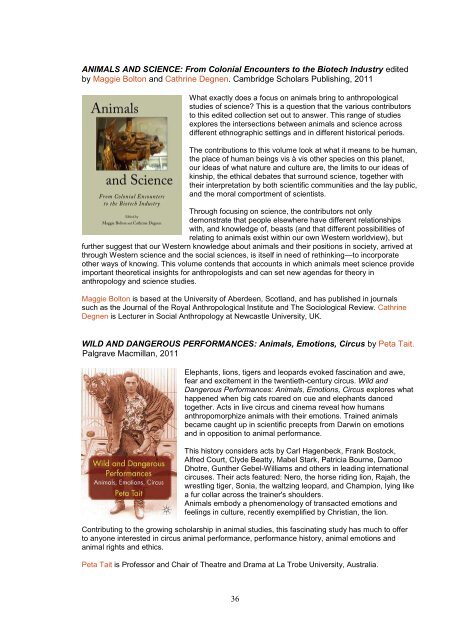News Bulletin - Australian Animal Studies Group
News Bulletin - Australian Animal Studies Group
News Bulletin - Australian Animal Studies Group
Create successful ePaper yourself
Turn your PDF publications into a flip-book with our unique Google optimized e-Paper software.
ANIMALS AND SCIENCE: From Colonial Encounters to the Biotech Industry edited<br />
by Maggie Bolton and Cathrine Degnen. Cambridge Scholars Publishing, 2011<br />
What exactly does a focus on animals bring to anthropological<br />
studies of science? This is a question that the various contributors<br />
to this edited collection set out to answer. This range of studies<br />
explores the intersections between animals and science across<br />
different ethnographic settings and in different historical periods.<br />
The contributions to this volume look at what it means to be human,<br />
the place of human beings vis à vis other species on this planet,<br />
our ideas of what nature and culture are, the limits to our ideas of<br />
kinship, the ethical debates that surround science, together with<br />
their interpretation by both scientific communities and the lay public,<br />
and the moral comportment of scientists.<br />
Through focusing on science, the contributors not only<br />
demonstrate that people elsewhere have different relationships<br />
with, and knowledge of, beasts (and that different possibilities of<br />
relating to animals exist within our own Western worldview), but<br />
further suggest that our Western knowledge about animals and their positions in society, arrived at<br />
through Western science and the social sciences, is itself in need of rethinking—to incorporate<br />
other ways of knowing. This volume contends that accounts in which animals meet science provide<br />
important theoretical insights for anthropologists and can set new agendas for theory in<br />
anthropology and science studies.<br />
Maggie Bolton is based at the University of Aberdeen, Scotland, and has published in journals<br />
such as the Journal of the Royal Anthropological Institute and The Sociological Review. Cathrine<br />
Degnen is Lecturer in Social Anthropology at Newcastle University, UK.<br />
WILD AND DANGEROUS PERFORMANCES: <strong>Animal</strong>s, Emotions, Circus by Peta Tait.<br />
Palgrave Macmillan, 2011<br />
Elephants, lions, tigers and leopards evoked fascination and awe,<br />
fear and excitement in the twentieth-century circus. Wild and<br />
Dangerous Performances: <strong>Animal</strong>s, Emotions, Circus explores what<br />
happened when big cats roared on cue and elephants danced<br />
together. Acts in live circus and cinema reveal how humans<br />
anthropomorphize animals with their emotions. Trained animals<br />
became caught up in scientific precepts from Darwin on emotions<br />
and in opposition to animal performance.<br />
This history considers acts by Carl Hagenbeck, Frank Bostock,<br />
Alfred Court, Clyde Beatty, Mabel Stark, Patricia Bourne, Damoo<br />
Dhotre, Gunther Gebel-Williams and others in leading international<br />
circuses. Their acts featured: Nero, the horse riding lion, Rajah, the<br />
wrestling tiger, Sonia, the waltzing leopard, and Champion, lying like<br />
a fur collar across the trainer's shoulders.<br />
<strong>Animal</strong>s embody a phenomenology of transacted emotions and<br />
feelings in culture, recently exemplified by Christian, the lion.<br />
Contributing to the growing scholarship in animal studies, this fascinating study has much to offer<br />
to anyone interested in circus animal performance, performance history, animal emotions and<br />
animal rights and ethics.<br />
Peta Tait is Professor and Chair of Theatre and Drama at La Trobe University, Australia.<br />
36


